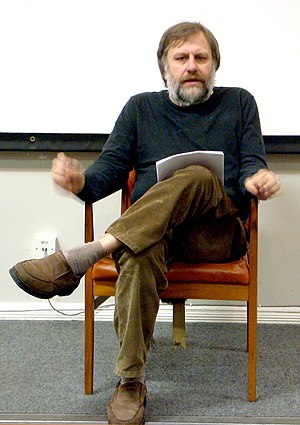But I think that that the differences in our political positions are so minimal that they cannot really account for the thoroughly dismissive tone of Chomsky’s attack on me. Our conflict is really about something else—it is simply a new chapter in the endless gigantomachy between so-called continental philosophy and the Anglo-Saxon empiricist tradition. There is nothing specific in Chomsky’s critique—the same accusations of irrationality, of empty posturing, of playing with fancy words, were heard hundreds of times against Hegel, against Heidegger, against Derrida, etc. What stands out is only the blind brutality of his dismissal...
After Noam Chomsky's
recent attack against not only Zizek but also
Jacques Lacan—"
Try to find in all of the work you mentioned some principles from which you can deduce conclusions, empirically testable propositions where it all goes beyond the level of something you can explain in five minutes to a twelve-year-old"—it once again became fashionable to criticize the "obscurantism," "charlatanism," and "nonsense" of Continental philosophers. Though it would only take a couple of minutes on Brian Leiter's blog to see the excesses of such anti-Continentalism (made all the more entertaining by the fact that Leiter consistently claims to be a friend to Continental philosophers, just not to those he deems unworthy because, you know, he gets to categorically decide such things while hypocritically criticizing what he sees as the divisiveness of others), such views, as Zizek points out, have quite a lengthy history behind them.
 |
| That's just Schelling being Schelling... |
Ironically, I believe that when Hegel accused Schelling of using his publications as a means to living his education in public a schism was instantiated that has since only grown. Either your work is completed or it is not to be put forth, either it is clear and concise, or it is obscure and obfuscation. "Obscure" philosophers struggle with what is hardest to grasp yet easiest to take for granted: everyday life. This comes out most clearly in the challenge Derrida issued to Levinas to, essentially, become MORE obscure in order to properly frame a discussion of how language really operates, to put on the printed page what is most ephemeral:
real life.
 |
| Seriously?? |
When
Plato uses analogies he is attempting to, essentially,
say what is unsayable, and, because this is Plato, this is treated as genius that withstands the test of time. But when Derrida, Foucault, Levinas, or countless others, try to similarly say the unsayable, they are read alongside analytic philosophers, philosophers who say only what is sayable, who struggle with what is not everyday life and do not struggle with what is.
Trolley car problems should receive the mockery reserved for Zizek's attempts to
analyze Tahrir Square, but because the former is immediately understandable and the latter is not, the former wins. If you read something and don't understand it, thinking it belongs more to poetry than to philosophy, then maybe you should ponder why "philosophy" no longer looks like the poetic struggle it did for Plato rather than taking for granted that
philosophy and clarity are desirable bedfellows.
As Zizek aptly concludes:
I think one can convincingly show that the continental tradition in philosophy, although often difficult to decode, and sometimes—I am the first to admit this—defiled by fancy jargon, remains in its core a mode of thinking which has its own rationality, inclusive of respect for empirical data. And I furthermore think that, in order to grasp the difficult predicament we are in today, to get an adequate cognitive mapping of our situation, one should not shirk the resorts of the continental tradition in all its guises, from the Hegelian dialectics to the French “deconstruction.” Chomsky obviously doesn’t agree with me here. So what if—just another fancy idea of mine—what if Chomsky cannot find anything in my work that goes “beyond the level of something you can explain in five minutes to a twelve-year-old because” because, when he deals with continental thought, it is his mind which functions as the mind of a twelve-year-old, the mind which is unable to distinguish serious philosophical reflection from empty posturing and playing with empty words?
 |
Inspiring, and makes
for a great coaster...
|
I have often thought that the Continental/Analytic divide comes down to the fact that Continental philosophers are disappointed comedians whereas
Analytic philosophers are disappointed mathematicians. What is important to remember though is that comedy is at its best, like the tradition of philosophy that stretches back beyond Plato, when it's trying to illuminate the world in which we live in new and unexpected ways. But mathematics is at its best when it's trying to explain the world, offering explanations that philosophy was born to criticize for their
superficial clarity and their
underlying obscurity. Analytic philosophy—a tradition that stretches back beyond logical positivism—however parrots these superficialities while mocking those who instead prefer to follow a different bird for their inspiration: the Owl of Minerva.









This is great! Thanks for a good read.
ReplyDeleteLook - I think we often go too far criticizing Hegel & Heidegger. There are truths that they're trying to construct, even if they don't fit the standard that we set out for ourselves.
ReplyDeleteBut we do have some points, I think. Defending an attempt to speak the unspeakable by pointing to Plato doesn't work if just apply the same critique to him. Trolley car problems aren't entirely removed from reality (see: http://www.technologyreview.com/view/542626/why-self-driving-cars-must-be-programmed-to-kill/). And regardless of whether Derrida is really saying something substantial, it is fair to suggest he COULD/SHOULD communicate more clearly. Zizek seems open to this being true, but less convinced of its importance. But maybe I'm wrong about its importance... there isn't really an empirical test for that so I'm out of my element.
--Adam, the disappointed mathematician